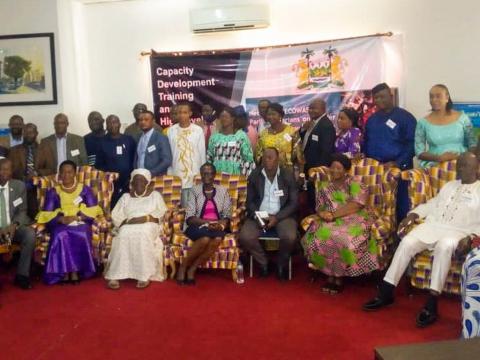A group of civil society organisations called the Sierra Leone Land Alliance (SLLA) has released a report critical of the situation land ownership and acquisition in the country, with particular emphasis on the Western area.
The report titled: “Land grabbing in a time of Covid-19 in Sierra Leone”, notes that since the outbreak of the pandemic in March this year, the issue of land has become what it described as a “currency of political patronage among Sierra Leone politicians’’, with large tracts of public land illegally or irregularly allocated, creating tension. The report lamented the poor surveying methods, which it attributed to lack of modern equipment and poor mapping and electronic surveying techniques.
The Alliance pointed out that action would have been taken on land grabbing, had the late Justice Edmond Cowan Constitutional Review Committee recommendation bordering on the National Land Policy of 2015 given the political endorsement, which would have also led to the setting up of the National Land Commission. The process of rectifying public land allocation has been very slow and the damage caused by land grabbing was also considered to be very slow, SLLA said.
The Alliance argued that illegal and irregular allocation of land has impacted negatively on public finances, land availability and pricing as well as on public finances and development opportunities. It was observed that the disparities in land ownership and wealth are the primary causes of tension between the government and citizens in the country.
The report also described the current process of land registration in Freetown as ‘’ineffective and disorganised’’, and the Registrar General’s limited physical presence in the parts of the city contributing to only minimal due diligence in registering land transactions.
Village headmen in rural areas were identified in the SLLA report for conniving with other individuals to sell land, thereby betraying the trust of the people in their communities who look upon them as custodians of the land. Surveyors at the Ministry of Lands, Housing and Country Planning were also accused of negligence by sitting in their offices instead of visiting land sites, leading to the issuance of multiple titles in the end.
According to the report, many schools and other public infrastructure have lost their playgrounds and forest reserves to land grabbing and that state actors have used the security forces to create an atmosphere of intimidation on issues to do with land possession.
The Alliance, in the report, made a number of recommendations including for a thorough updating of the country’s land administration and registration system that will also involve large-scale resurvey of public land, provision of an updated land inventory, legitimization of title deeds, and digitization of records.
The Anti-Corruption Commission was also urged to expedite cases of illegal land acquisition and punish those defaulters, including seizure of their certificates and for government to revisit the 2016 Constitutional Review Committee report recommendations on Lands and harmonizing of all laws on land related issues. It was also recommended that awareness be raised and training conducted to help communities understand and protect their land rights and to represent their interests in dealing with governments.
Government should also establish a National Lands Commission and put in place policies for the operationalization of the commission at chiefdom, district and national level and for devolving the Ministry of Lands, Housing and Country Planning to the local councils, according to the group of Civil Society Organisations.
SLLA also recommended that the leadership of the Police and Military put a ban on all politicians using armed body guards to grab or protect land in the Western Area and for efforts to be made to accelerate the establishment of Chiefdom Land Registries that would serve as local repository for customary land records.
Copyright © 2020 Politico Online








